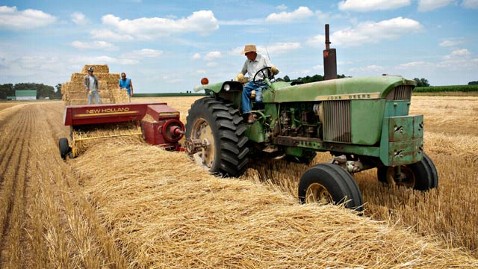Farm Bill Vote Fails, Stunned GOP Blames Dems

Image credit: Daniel Acker/Bloomberg via Getty Images
House Republicans are pointing at Democrats as they try to explain why the Federal Agriculture Reform and Risk Management, widely known as the farm bill, failed to pass out of the House of Representatives this afternoon.
The vote failed 195-234, winning the support of just 24 Democrats, and stunning the Republican leadership as their best option to advance a bill went down in flames.
Despite extensive qualms on both sides of the aisle, the legislation was expected to pass in a bipartisan vote, affording lawmakers the opportunity to later reconcile differences with the Senate-passed $955 billion legislation, which won a bipartisan vote June 10, 66-27.
The Associated Press reported Wednesday that Rep. Collin Peterson, the top Democrat on the Agriculture committee, predicted "at least 40 Democrats" would support the House bill.
Lawmakers will probably never know whether those phantom 16 Democratic votes would have been enough to ensure the bill's passage. In the end, 62 Republicans opposed the measure and the bill fell well short of the 218 votes needed to pass.
The $500 billion bill would have cut about $10 billion over the next five years from food stamps while increasing subsidies for certain crops. About $80 billion each year was marked for the Supplemental Nutrition Assistance Program food stamp program, disenchanting many Republicans who believed the cuts were not steep enough.
The bill's defeat is viewed as a crushing blow to House Speaker John Boehner, who until today had only voted for one farm bill in his 12 terms in Congress, but urged his colleagues to support it.
House Majority Leader Eric Cantor admitted the bill was "far from perfect," but noted that "the only way to achieve meaningful reform" was to take the legislation to conference with the Senate.
"I'm extremely disappointed that Nancy Pelosi and Democratic leadership have at the last minute chosen to derail years of bipartisan work on the farm bill and related reforms," Cantor, R-Va., stated. He added that he was "sorry that Democrats shamefully chose politics over progress and meaningful reform."
Once the bill went down, senior Republican aides did their best to excuse the shocking defeat.
"House Democrats promised 40 votes on final passage of FARRM. This afternoon, Ranking Member Peterson alerted Chairman [Frank] Lucas at the very last minute that he could not produce what he promised under pressure from both the White House and House Democratic leadership," one senior GOP aide wrote in an email after the vote. "Republicans delivered the exact number of votes we had promised, per our very accurate whip count. Today, good faith bipartisanship is trumped by bad faith politics."
Peterson, however, placed the blame squarely on "the extreme right wing" of the Republican Party.
"From day one I cautioned my colleagues that to pass a farm bill we would have to work together. Instead, the House adopted a partisan amendment process, playing political games with extreme policies that have no chance of becoming law," Peterson, D-Minn., wrote in a statement following the vote. "This flies in the face of nearly four years of bipartisan work done by the Agriculture Committee. I'll continue to do everything I can to get a farm bill passed but I have a hard time seeing where we go from here."
Democrats complained that the bill would slash food aid for nearly 2 million Americans, including many living below the poverty level, and more than 200,000 children would be denied free school lunch and breakfast.
"This ill-conceived bill would reduce critical assistance to families struggling to put food on their tables," Rep. Jim Langevin, D-R.I., stated. "While I support many of the provisions included in the farm bill, it is unconscionable that we would force the most vulnerable among us to suffer the biggest burden as we work to achieve greater fiscal responsibility in our farm programs."
The fiscal cliff deal signed into law by the president early this year included a provision to extend the 2008 farm bill through the end of the fiscal year, September 30, 2013. So lawmakers have a little time to think about this before really coming under the guillotine.
SNAP is permanent law, so its funding would keep going even past Sept. 30 at current levels if Congress doesn't reform the legislation. The only way anyone's benefits would change in the future is if Congress acts to reform the program in new legislation.
The agriculture elements of the bill, which account for about 20 percent of the spending in the failed bill, are what is truly threatened by a congressional stalemate. Many of those provisions are set to expire this fall without future congressional action.
Lawmakers on both sides admit that the farm bill's future is now uncertain, although Rep. Frank Lucas, the chairman of the agriculture committee, expressed optimism that both sides would ultimately come together.
"On this day, on this vote, the House worked its will. I'm obviously disappointed, but the reforms in H.R. 1947 - $40 billion in deficit reduction, elimination of direct payments and the first reforms to SNAP since 1996 - are so important that we must continue to pursue them," Lucas, R-Okla., stated. "We are assessing all of our options, but I have no doubt that we will finish our work in the near future and provide the certainty that our farmers, ranchers, and rural constituents need."
The House returns to session next Tuesday for a four-day work week, prior to a weeklong recess to celebrate Independence Day.
*This story has been corrected to reflect Boehner's vote in favor of the 1996 farm bill, the Federal Agriculture Improvement and Reform Act of 1996